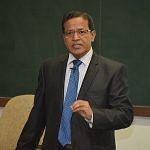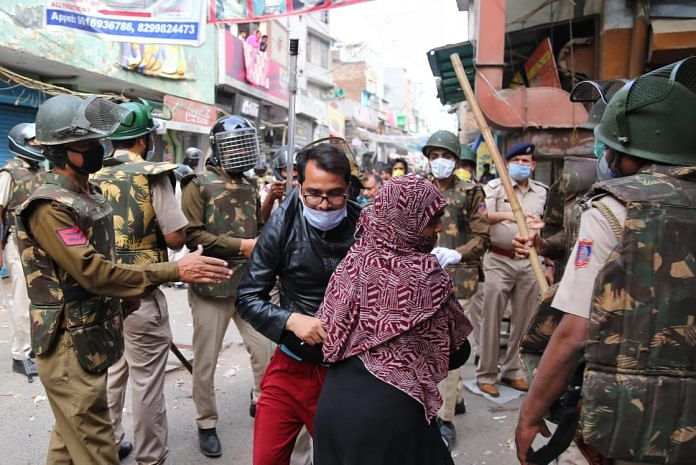 Let’s use follower’s advantage
Let’s use follower’s advantage
Kaushik Basu | C Marks Professor at Cornell University and former Chief Economist and Senior Vice President, World Bank
The Indian Express
Basu states that the lockdown announced in India is a good measure, but following it up is necessary. “There are reports of the police wielding the baton too quickly on ordinary vendors, small grocers and sellers,” says Basu. He explains that “a part of this is because there is a lot of genuine misunderstanding, even among the police, let alone ordinary citizens, about what is allowed and what is not”. He argues that “we have to clarify these and impress upon our police that they have to be both the enforcer of the law and helping-hand for distressed people. They need to explain to people so that they begin to actually cooperate, instead of complying only when under observation”.
 Lockdown and the poor
Lockdown and the poor
Harsh Mander | Mander is a human rights worker and writer
The Indian Express
Mander writes about the difficulties poor people are facing during the lockdown in India. He argues that neither Finance Minister Nirmala Sitharaman nor Prime Minister Modi, in their addresses on measures to fight Covid-19, acknowledged even a fraction of the potentially catastrophic impact of these measures on hundreds of millions of India’s informal workers, farmworkers and destitute people. He calls the lockdown “shockingly anti-poor” and asks India to take inspiration from South Korea and Taiwan, who battled the virus without a lockdown.
 Safeguarding the vulnerable among us
Safeguarding the vulnerable among us
Guy Ryder | Director-General, International Labour Organization
The Hindu
Ryder comments on the economic impact of the coronavirus pandemic. He says “we have a chance to save millions of jobs and enterprises, if governments act decisively to ensure business continuity, prevent lay-offs and protect vulnerable workers”. He notes that there is “no doubt that the decisions they take today will determine the health of our societies and economies for years to come”. He argues that “unprecedented, expansionary fiscal and monetary policies are essential to prevent the current headlong downturn from becoming a prolonged recession.”
 Imagining a different, better future
Imagining a different, better future
Navroz K. Dubash | Professor at the Centre for Policy Research, and the editor of India in a Warming World: Integrating Climate Change and Development
Hindustan Times
Dubash comments on the behavioural changes that are occuring during the coronavirus pandemic lockdown. “For example, work from home (WFH) has become a reality for millions who are trying to maintain productivity and manage teamwork”, explains Dubash. He says “going further, we could limit travel by meeting more of our leisure needs locally and through creative livestreams.” He argues that “If sustained, behavioural changes, induced by Covid-19, can alter the way we live and work”
 A lockdown only adds to virus concerns
A lockdown only adds to virus concerns
Jagdish Rattanani | Journalist and a faculty member at SPJIMR
The Hindu Business Line
Rattanani ascribes a “moral duty” to the central government “to ensure that the lockdown doesn’t lead to a total collapse”. He raises concern about excessive police force used against lockdown violators (usually daily wage workers), doctors shutting shop temporarily and various hiccups in the movement of essential goods and services. “A well thought through and reasonable decision to lock down the nation is in effect, a poor choice,” he writes.
 An economic and humanitarian disaster must quickly be averted
An economic and humanitarian disaster must quickly be averted
Himanshu | Associate professor at Jawaharlal Nehru University and visiting fellow at the Centre de Sciences Humaines, New Delhi
Mint
Himanshu delves into the economic costs of the nationwide lockdown, imposed to curb the Covid-19 pandemic. A fall in rural wages and breakdown of supply chains are just some of the consequences, he notes. While the government’s “short-term relief package” to informal sector workers is commendable, there also needs to be “a strategy to revive the economy, which is likely to slide very fast”, he concludes.
 The solidarity of the shaken as we face our own frailty
The solidarity of the shaken as we face our own frailty
Ramin Jahanbegloo | Executive director of the Mahatma Gandhi Centre for Non-violence and Peace Studies
Mint
Jahanbegloo interprets the Covid-19 pandemic as a “global march” and “a new endeavour for humanity” which is “perhaps the most significant since the fight against Nazism in the 1940s”. The pandemic has returned to the world “a sense of empathy that was concealed for half a century by utilitarian and materialistic modes of human life around the globe”, he writes.
 The world will be as one
The world will be as one
Vijay Verghese | Hong Kong-based journalist, columnist and the editor of AsianConversations.com and SmartTravelAsia.com
Business Standard
Verghese appreciates the “changed worldview” that the Covid-19 pandemic has brought about. Amidst the “triumphal progress of globalism” and “xenophobic nationalism”, people are now realising they need each other to surive, he adds. He suggests “sensible regulation to prevent overharvesting of tourism” and “enriching immersion in smaller numbers that do not overwhelm the destination”.
 Steering public policy during a crisis
Steering public policy during a crisis
Barendra Kumar Bhoi | Visiting Fellow, IGIDR & former Head, Monetary Policy Department, RBI
Financial Express
In view of the coronavirus pandemic, Bhoi calls for meticulous public policy decisions from the prime minister’s Economic Response Taskforce that has been “appointed to protect the economy from the Covid-19 attack”. He hopes public authorities will “refrain from the policy excesses of the past”. However, “marginal deviation from [fiscal and monetary policy] rules may be absorbed by financial markets, but systematic ones, and for a long period, may expose public authorities to helplessness in the time of a crisis”, he warns.
 No company must close
No company must close
Ram Singh | Professor, Delhi School of Economics
Economic Times
Singh criticises the Rs 1.7 lakh crore Covid-19 mitigation economic relief package that the Centre has offered to daily wagers. Not only is this not enough, it needs to be “recalibrated for better effect”, he adds. The Centre should also be seriously considering investing in healthcare “to augment capacity for diagnostic tests & intensive care, as well as preventive tools to suppress the virus”. To prevent a recession, RBI should refrain from purchasing corporate bonds and consider a rate cut, big open-market operations and relaxing the fiscal deficit targets to 6 per cent, he adds.
Stop using fuel taxes as mulch cow
 Uttam Gupta | Policy analyst
Uttam Gupta | Policy analyst
Financial Express
Gupta criticises the Centre’s decision to hike excise duty on petrol and diesel. He explains that in the current scenario, there is “muted tax collection” and “surge in resources required to deal with the economic crisis triggered by Covid-19”. However, this should not stop the government from placing petrol and diesel in the 18 per cent tax slab under GST or indefinitely postponing the “switch over”, he adds.
Today’s Editorials
The Indian Express: The attack on the Sikh community in Kabul has made it clear that the US-Taliban deal was not able to return Afghanistan to peace, writes Express. While the Taliban has denied any role in the attacks, Pakistan has also condemned it strongly. Therefore, it is not known who is the IS (Islamic State) in Afghanistan. After the number of confirmed cases of coronavirus rose to 58, the region now faces two contagions, Covid-19 and the relentless violence, it writes.
Hindustan Times: The daily says that the scale of the lockdown given the huge population of India is unprecedented. While the onus rests on the citizens to follow the lockdown, the government should also make sure that no extra-legal measures are taken. The authorities need to be clearly instructed to allow the supply of essentials and need to communicate with citizens properly, argues HT.
The Times of India: TOI endorses telemedicine and writes that it can spare many patients the ordeal of travelling to urban areas for medical help. It can also address the demand-supply anomalies of the medical field. Tight regulation of these services can curb malpractices and protect both doctors and patients, it notes.
The Hindu: The PM Gareeb Kalyan Yojana announced by Finance Minister Nirmala Sitharaman is a good first step towards alleviating the distress caused due to the coronavirus lockdown, notes Hindu. It praises the innovative ways in which the government is seeking to offer relief while keeping it within the budget limit. However, it hopes that the next part of the package focuses on businesses running out of cash.
With inputs from Unnati Sharma




Harsh Mander will think differently when his family member gest COVID-19.
Why don’t they allow constant public announcements. So many times I’ve offered to help, but the there is no response from the police. They can give the recorded message, we can play it from our roofs or balconies or they can play it from their vehicles. There are so many who don’t know yet, living in ignorance and the rich are exploiting them in colonies by asking them to still report on work. WHAAT IS THIS CALLOUS WAY OF DEALING WITH A SITUATION SO SERIOUS. KTR sirs free meal is good however, I fear the large gathering is going to explode!!!